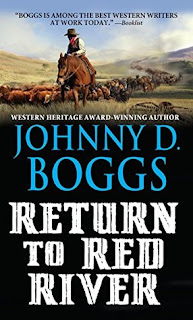Return to Red River
Some might find it audacious for Johnny D. Boggs to write a sequel to Red River, the classic 1948 film starring John Wayne and Montgomery Clift. Actually, he has written a sequel to the book that it was based on, and it's a solid, old-fashioned Western that could have been written in 1948.
The book picks up with Matthew Garth, who was played by Clift, as he manages the ranch he inherited from Thomas Dunson (who was played by Wayne). It's twenty years later. He married Tess Millay, the prostitute (although that word isn't used in the film or in this book) and has two sons, Lightning and Tom. The secret is that Lightning is not their natural son.
Garth, like Dunson twenty years later, is short on cash, and has to drive his cattle across the Red River and into Kansas. The book takes a little too long setting this up--I think the drive starts about halfway into the action.
"Longhorns. Some of these, no, probably almost every last one of them, a descendant of the first cattle brought to Mexico by Gregorio de Villalobos back in 1591, after Christopher Columbus had deposited some in Santo Domingo back in 1494. Around 1690, a herd numbering roughly two hundred had been trailed to a Texas mission near the Sabine River. Now Mathew Garth had to get these cattle to Dodge City, Kansas." This kind of stentorian prose and research is to reading like macaroni and cheese is to food. It's not great, but it's comforting, especially to those who like old Westerns.
The cattle drive, of course, is fraught with danger--a stampede, a fire, and someone following them. It may be Jess Teveler, wanted by the Texas Rangers, and who has something against the Garths. The ending provides the traditional showdown and gunplay.
Every once in a while a read like this is a great switch from literary fiction. Boggs is clearly a student of this genre. And any book that can have a passage like this is fine with me: "For more than five weeks, they had been wet, and they had been dry. Baking underneath a broiling sun or freezing in their soaking clothes after a cold rain. Mostly, they had been bone tired, aching, miserable. Awake before sunrise, then in a saddle till noon, a quick bite of food washed down with coffee, a fresh horse, and back in the saddle."
The book picks up with Matthew Garth, who was played by Clift, as he manages the ranch he inherited from Thomas Dunson (who was played by Wayne). It's twenty years later. He married Tess Millay, the prostitute (although that word isn't used in the film or in this book) and has two sons, Lightning and Tom. The secret is that Lightning is not their natural son.
Garth, like Dunson twenty years later, is short on cash, and has to drive his cattle across the Red River and into Kansas. The book takes a little too long setting this up--I think the drive starts about halfway into the action.
"Longhorns. Some of these, no, probably almost every last one of them, a descendant of the first cattle brought to Mexico by Gregorio de Villalobos back in 1591, after Christopher Columbus had deposited some in Santo Domingo back in 1494. Around 1690, a herd numbering roughly two hundred had been trailed to a Texas mission near the Sabine River. Now Mathew Garth had to get these cattle to Dodge City, Kansas." This kind of stentorian prose and research is to reading like macaroni and cheese is to food. It's not great, but it's comforting, especially to those who like old Westerns.
The cattle drive, of course, is fraught with danger--a stampede, a fire, and someone following them. It may be Jess Teveler, wanted by the Texas Rangers, and who has something against the Garths. The ending provides the traditional showdown and gunplay.
Every once in a while a read like this is a great switch from literary fiction. Boggs is clearly a student of this genre. And any book that can have a passage like this is fine with me: "For more than five weeks, they had been wet, and they had been dry. Baking underneath a broiling sun or freezing in their soaking clothes after a cold rain. Mostly, they had been bone tired, aching, miserable. Awake before sunrise, then in a saddle till noon, a quick bite of food washed down with coffee, a fresh horse, and back in the saddle."



Comments
Post a Comment